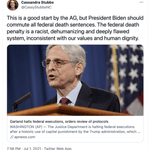
In a memorandum that left to Congress the task of addressing systemic questions of arbitrariness, racial discrimination, and wrongful convictions affecting the administration of the federal death penalty, U.S. Attorney General Merrick Garland (pictured) issued a directive formally pausing federal executions while the Department of Justice (DOJ) undertakes a review of executive branch policies adopted in the last two years of the Trump administration.
Garland’s memorandum, issued late in the day June 30, 2021, prior to the federal government’s closure for the July 4th holiday weekend, was as expansive in touting constitutional guarantees as it was narrow in its focus for action. “The Department of Justice must ensure that everyone in the federal criminal justice system is not only afforded the rights guaranteed by the Constitution and laws of the United States, but is also treated fairly and humanely. That obligation has special force in capital cases,” Garland wrote.
Garland said, “[s]erious concerns have been raised about the continued use of the death penalty across the country, including arbitrariness in its application, disparate impact on people of color, and the troubling number of exonerations in capital and other serious cases.” However, while describing these issues as “weighty concerns,” Garland said they “deserve careful study and evaluation by lawmakers.” While others address those issues, Garland said, the Department of Justice must “take care to scrupulously maintain our commitment to fairness and humane treatment in the administration of existing federal laws governing capital sentences.”
The Attorney General said DOJ would review three changes to the department’s death-penalty policies and procedures that were adopted under attorneys general William Barr and Jeffrey Rosen. Those changes are: an addendum to the federal execution protocol, announced on July 25, 2019, that replaced the previous three-drug lethal injection procedure with a single-drug execution using the barbiturate pentobarbital; manner of execution regulations that, in certain circumstances, authorize the federal government to carry out executions by electric chair, firing squad, nitrogen hypoxia, or cyanide gas; and lame-duck revisions to DOJ’s Justice Manual that Garland said were “a departure from longstanding practice” and would “expedite the execution of capital sentences.”
Garland’s directive does not prevent federal prosecutors from seeking the death penalty in new cases, pursuing the death penalty in cases in which the Trump administration authorized capital prosecution, opposing appeals brought by current federal death-row prisoners, or seeking to reinstate death sentences that have been overturned by federal appeals courts. Most recently, the Garland Department of Justice argued in the U.S. Court of Appeals for the Fourth Circuit that the court should uphold the death sentences imposed on Dylann Roof for the murders of nine African-American worshippers at the Emanuel African Methodist Episcopal Church in Charleston, South Carolina and filed a brief in the U.S. Supreme Court seeking to restore the death sentence imposed on Dzhokhar Tsarnaev for his role in the Boston Marathon bombing.
Reaction to the Attorney General’s Announcement
Death Penalty Information Center executive director Robert Dunham described the Department of Justice action as a “mini-moratorium.” A review of the federal death penalty that is limited to the regulatory and policy changes adopted by the Trump administration to facilitate the six-month execution spree at the end of its time in office “barely even scratches the surface of death-penalty reform,” he said. “It may be making [some] reforms, but it isn’t fulfilling the Biden campaign pledge” to work to end the death penalty. To do that, Dunham said, DOJ would have to forego seeking new death sentences and Biden would have to commute federal death row or win congressional support to repeal the federal death penalty.
Capital defense lawyers and death penalty opponents offered muted praise for Garland’s declaration. Ruth Friedman, the director of the Federal Capital Habeas Project, which provides assistance to federal death-row prisoners and their lawyers in federal post-conviction appeals, said: “A moratorium on federal executions is one step in the right direction, but it is not enough. We know the federal death penalty system is marred by racial bias, arbitrariness, over-reaching, and grievous mistakes by defense lawyers and prosecutors that make it broken beyond repair. President Biden, with the support of the Department of Justice, can and should commute all federal death sentences to address these problems. Otherwise, this moratorium will just leave these intractable issues unremedied and pave the way for another unconscionable bloodbath like we saw last year.”
Death-penalty abolitionists expressed similar sentiments. Cassandra Stubbs, director of the ACLU Death Penalty Project, tweeted: “This is a good start by the AG, but President Biden should commute all federal death sentences. The federal death penalty is a racist, dehumanizing and deeply flawed system, inconsistent with our values and human dignity.”

Amnesty International USA issued a statement by Kristina Roth, its Senior Advocate for Criminal Justice Programs, saying: “The moratorium on federal executions is a welcome first step, but more must be done immediately to stop the use of the ultimate cruel, inhuman and degrading punishment, including commuting all federal sentences.” Witness to Innocence, an organization of former death-row prisoners exonerated from wrongful convictions, tweeted that the DOJ’s regulatory review moratorium is a “step in the right direction, but not enough. Biden can and SHOULD commute fed death row,” they said.
Representative Ayanna Pressley (D – Massachusetts), the lead sponsor of one of the two bills to abolish the federal death penalty that have been introduced in the House of Representatives, also urged the President to do more to effectuate his campaign pledge. “Today, the Department of Justice took welcome and long overdue action,” she said in a press release. “I applaud the Biden Administration for being responsive to our calls and to the generations of activists organizing to abolish the death penalty.”
“We continue to call on President Biden to commute the sentences of those on death row and ensure a fair resentencing process, direct DOJ prosecutors to no longer seek the death penalty and dismantle the death row facility at Terre Haute,” she said.
Archbishops Paul S. Coakley of Oklahoma City and Joseph F. Naumann of Kansas City, Kansas released a letter on behalf of the U.S. Conference of Catholic Bishops. “The news of the Department of Justice’s moratorium on federal executions is a welcome step,” the bishops wrote, “and we must also tirelessly continue to advocate for the abolition of the death penalty from both our state and federal laws as we build a culture of life.”
Krisanne Vaillancourt Murphy, executive director of the Catholic Mobilizing Network, said the moratorium, “though a discernible first step, is not enough on its own. … More needs to be done,” she said. “President Biden promised a permanent road closure on the federal death penalty; a moratorium is more like a temporary stop sign on the road to [future] federal executions,” Vaillancourt Murphy said.

Death-penalty proponents were largely silent. In a tweet, Arkansas U.S. Senator Tom Cotton falsely claimed that the temporary moratorium would delay the execution of Dylann Roof, whose direct appeal is currently pending before a federal appeals court and, if he loses that appeal, has years of federal habeas corpus review after that. “White supremacist Dylann Roof murdered nine African Americans at a Bible study,” Cotton tweeted. “Merrick Garland just paused his execution. Disgraceful.”
In fact, the moratorium does not affect Roof’s case and does not delay any ongoing federal death penalty appeal.
Katie Benner, Merrick Garland pauses federal executions a year after his predecessor resumed them, New York Times, July 1, 2021; Devlin Barrett and Amy B Wang, Federal executions halted as Justice Dept. reviews Trump-era policies, Washington Post, July 1, 2021; Sadie Gurman, Justice Department Orders Halt to Federal Executions, Wall Street Journal, July 1, 2021; Christina Carrega, Garland suspends federal executions and orders review of Trump-era rules, CNN, July 1, 2021; Jordan S. Rubin, Execution Pause Is Incomplete Step Toward Biden Abolition Pledge, Bloomberg Law, July 2, 2021; Emily Zantow, Advocates say DOJ federal execution moratorium ‘not enough’, Washington Times, July 2, 2021; Carol Zimmermann, Activists see temporary stop of federal executions as a starting point, Catholic News Service, July 2, 2021; Kate Scanlon, US Justice Department halts federal executions, Catholic News Agency, July 2, 2021.
Read the Attorney General’s Memorandum on a Moratorium on Federal Executions Pending Review of Policies and Procedures, July 1, 2021.
Read the statements regarding the DOJ moratorium announcement: Press Release, Attorney General Merrick B. Garland Imposes a Moratorium on Federal Executions; Orders Review of Policies and Procedures, Department of Justice, Office of Public Affairs, July 1, 2021; Press Release, Statement from Rep. Pressley on DOJ Moratorium on Federal Executions, Office of U.S. Congresswoman Ayanna Pressley, July 1, 2021; Statement of Ruth Friedman, Director, Federal Capital Habeas Project, July 1, 2021; The Moratorium on Federal Executions Highlights Need to Abolish the DeathPenalty, Once and For All., Amnesty International USA, July 2, 2021; Public Affairs Office, U.S. Bishop Chairmen on Justice Department’s Moratorium on Federal Executions, U.S. Conference of Catholic Bishops, July 3, 2021.



